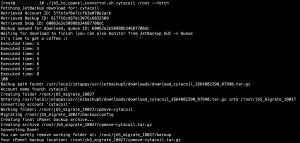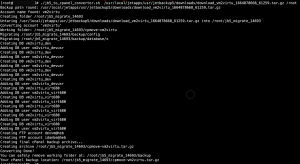JetBackup 5 introduces multi-panel support, meaning that backups can be created in a cPanel server, for example, can be restored on a DirectAdmin server (and vice versa).
To achieve that, the JetBackup team has to create its own unique backup structure (Unlike JetBackup v4 which was based on the cPanel backups structure).
Here is a “Quick & Dirty” bash magic script that will convert a JetBackup 5 structure into cPanel backup structure (“cpmove file”), the generated cPmove file can be restored on any cPanel server (/scripts/restorepkg) regardless of JetBackup (doesn’t have to be installed on the server).
The script can generate a cPanel backup from an already downloaded backup file (usually located at /usr/local/jetapps/usr/jetbackup5/downloads), or you can provide a username, and it will fetch the latest backup automatically (given that there are full active backups for that account).
RAW version: https://thelazyadmin.blog/scripts/jb5_to_cpanel_convertor.txt
Quick Download
wget https://thelazyadmin.blog/scripts/jb5_to_cpanel_convertor.txt -O /root/jb5_to_cpanel_convertor.sh chmod +x /root/jb5_to_cpanel_convertor.sh cd /root ./jb5_to_cpanel_convertor.sh
Full Script
#!/bin/bash # # Created by TheLazyAdmin, https://thelazyadmin.blog # # ** USE AT YOUR OWN RISK ** # function print_help { echo " Example for manual usage : jb5_to_cpanel_convertor.sh {JETBACKUP5_BACKUP} {DESTINATION_ARCHIVE} {JETBACKUP5_BACKUP} JetBackup file location {DESTINATION_ARCHIVE} Where to put the cPanel gereated backup jb5_to_cpanel_convertor.sh /usr/local/jetapps/usr/jetbackup5/downloads/download_jb5user_1663238955_28117.tar.gz /root/cpanel_structure Example for auto usage : jb5_to_cpanel_convertor.sh {ACCOUNT} {DESTINATION_ARCHIVE} --fetch {ACCOUNT} cPanel Account name {DESTINATION_ARCHIVE} Where to put the cPanel generated backup --fetch Auto download the *LAST* backup for the specified account jb5_to_cpanel_convertor.sh username /root/cpanel_structure --fetch " exit 0 } function message { echo ""; echo "$1"; echo ""; [[ -z $2 ]] && print_help exit } function untar() { BACKUP_PATH=$1 DESTINATION_PATH=$2 tar -xf $BACKUP_PATH -C $DESTINATION_PATH CODE=$? [[ $CODE -gt 0 ]] && message "Unable to untar the file $BACKUP_PATH" 1 } function extract() { FILE_PATH=$1 gunzip $FILE_PATH CODE=$? [[ $CODE -gt 0 ]] && message "Unable to extract files" 1 } function create_dir() { DIRECTORY_PATH=$1 mkdir $DIRECTORY_PATH >/dev/null 2>&1 CODE=$? [[ $CODE -gt 0 ]] && message "Error: The directory $DIRECTORY_PATH already exist delete the directory to continue" 1 } function move_dir() { echo "Migrating $1" SOURCE=$1 DESTINATION=$2 mv $SOURCE $DESTINATION CODE=$? [[ $CODE -gt 0 ]] && message "error occurred" 1 } function archive() { TAR_NAME=$1 echo "Creating archive $UNZIP_DESTINATION/$TAR_NAME" cd $UNZIP_DESTINATION tar -czf "$TAR_NAME" cpmove-"$ACCOUNT_NAME" >/dev/null 2>&1 CODE=$? [[ $CODE != 0 ]] && message "Unable to create tar file" 1 } function create_ftp_account() { DIRECTORY_PATH=$1 CONFIG_PATH=$2 HOMEDIR=$( cat $CONFIG_PATH/meta/homedir_paths ) USER=$( ls $CONFIG_PATH/cp/) for FILE in $(ls $DIRECTORY_PATH | grep -iE "\.acct$"); do USERNAME=$(cat $DIRECTORY_PATH/$FILE | grep -Po '(?<=name: )(\w\D+)') PASSWORD=$(cat $DIRECTORY_PATH/$FILE | grep -Po '(?<=password: )([A-Za-z0-9!@#$%^&*,()\/\\.])+') PUBLIC_HTML_PATH=$(cat $DIRECTORY_PATH/$FILE | grep -Po '(?<=path: )([A-Za-z0-9\/_.-]+)') echo "Creating FTP account $USERNAME"; printf "$USERNAME:$PASSWORD:0:0:$USER:$HOMEDIR/$PUBLIC_HTML_PATH:/bin/ftpsh" >> $CPANEL_DIRECTORY/proftpdpasswd done } function create_mysql_file() { DIRECTORY_PATH=$1 SQL_FILE_PATH=$2 for FILE in $(ls $DIRECTORY_PATH | grep -iE "\.user$"); do USERNAME=$(cat $DIRECTORY_PATH/$FILE | grep -Po '(?<=name: )([a-zA-Z0-9!@#$%^&*(\)\_\.-]+)') DATABASE=$(cat $DIRECTORY_PATH/$FILE | grep -Po '(?<=database `)([_a-zA-Z0-9]+)') USER=$(cat $DIRECTORY_PATH/$FILE | grep -Po '(?<=name: )([a-zA-Z0-9!#$%^&*(\)\_\.]+)') DOMAIN=$(echo $USERNAME | grep -Po '(?<=@)(.*)$') PASSWORD=$(cat $DIRECTORY_PATH/$FILE | grep -Po '(?<=password: )([a-zA-Z0-9*]+)') PERMISSIONS=$(cat $DIRECTORY_PATH/$FILE | grep -Po '(?<=:)[A-Z ,]+$') echo "Creating DB $DATABASE" echo "Adding DB user $USER" echo "GRANT USAGE ON *.* TO '$USER'@'$DOMAIN' IDENTIFIED BY PASSWORD '$PASSWORD';" >> $SQL_FILE_PATH echo "GRANT$PERMISSIONS ON \`$DATABASE\`.* TO '$USER'@'$DOMAIN';" >> $SQL_FILE_PATH done } function create_email_account() { BACKUP_EMAIL_PATH=$1 DESTINATION_EMAIL_PATH=$2 DOMAIN_USER=$( cat $CPANEL_DIRECTORY/cp/$ACCOUNT_NAME | grep -Po '(?<=DNS=)([A-Za-z0-9-.]+)') echo "Creating email accounts for $DOMAIN_USER" for JSON_FILE in $(ls $BACKUP_EMAIL_PATH | grep -iE "\.conf$"); do PASSWORD=$(cat $BACKUP_EMAIL_PATH/$JSON_FILE | grep -Po '(?<=,"password":")([a-zA-Z0-9\=,]+)') DECODED_PASSWORD=$(echo $PASSWORD | base64 --decode ) printf $DOMAIN_USER:$DECODED_PASSWORD >> $DESTINATION_EMAIL_PATH/$DOMAIN_USER/shadow done } FILE_PATH=$1 DES_PATH=$2 UNZIP_DESTINATION=$DES_PATH/jb5_migrate_$RANDOM FETCH_DOWNLOAD=$3 [[ $DES_PATH == "/" ]] && message "Error :: Don't use root folder as destination" [[ $DES_PATH == "--fetch" ]] && message "Error :: Destination path not provided" if [[ $FETCH_DOWNLOAD == "--fetch" ]]; then ACCOUNT_NAME=$1 id $ACCOUNT_NAME > /dev/null 2>&1 CODE=$? [[ $CODE != 0 ]] && message "Provided user $ACCOUNT_NAME not found" 1 JETBACKUP_ACCOUNT_NAME=$ACCOUNT_NAME echo "Fetching JetBackup download for: $JETBACKUP_ACCOUNT_NAME" JETBACKUP_ACCOUNT_ID=$( /usr/bin/jetbackup5api -F listBackupForAccounts -D "type=1&contains=511" | grep -w "$JETBACKUP_ACCOUNT_NAME" -B1 | grep 'account_id' | awk {'print $2'} ) [[ -z "$JETBACKUP_ACCOUNT_ID" ]] && message "No full backups found for this account" 1 echo "Retrieved Account ID: $JETBACKUP_ACCOUNT_ID" JETBACKUP_BACKUP_ID=$( /usr/bin/jetbackup5api -F listBackupForTypeName -D "type=1&contains=511&account_id=$JETBACKUP_ACCOUNT_ID&name=$JETBACKUP_ACCOUNT_NAME" | grep 'parent_id' -B1 | grep -w -m1 '_id:' | awk {'print $2'} ) [[ -z "$JETBACKUP_BACKUP_ID" ]] && message "Something went wrong, couldn't retrieve an account ID" 1 echo "Retrieved Backup ID: $JETBACKUP_BACKUP_ID" JETBACKUP_SNAP_ID=$( /usr/bin/jetbackup5api -F getBackupItem -D "_id=$JETBACKUP_BACKUP_ID" | grep 'parent_id' | awk {'print $2'} ) [[ -z "$JETBACKUP_SNAP_ID" ]] && message "Something went wrong, couldn't retrieve an snap ID" 1 echo "Retrieved Snap ID: $JETBACKUP_SNAP_ID" JETBACKUP_QUEUE_ID=$( /usr/bin/jetbackup5api -F addQueueItems -D "type=4&snapshot_id=$JETBACKUP_SNAP_ID" | grep '_id:' | awk {'print $2'} ) [[ -z "$JETBACKUP_SNAP_ID" ]] && message "Something went wrong, couldn't add to queue" 1 echo "Backup queued for download, queue ID: $JETBACKUP_SNAP_ID" echo "Waiting for download to finish (you can also monitor from JetBackup GUI -> Queue)" echo "It's time to get a coffee :)" RETRY=1 JET_BREAK=0 while [ $RETRY -ne 0 ] do sleep 1 JETBACKUP_QUEUE_STATUS=$( /usr/bin/jetbackup5api -F getQueueGroup -D "_id=$JETBACKUP_QUEUE_ID" | grep 'status:' | awk {'print $2'} ) case $JETBACKUP_QUEUE_STATUS in 30) JETBACKUP_QUEUE_EXEC=$( /usr/bin/jetbackup5api -F getQueueGroup -D "_id=$JETBACKUP_QUEUE_ID" | grep 'execution_time:' | awk {'print $2'} ) echo "Executed time: $JETBACKUP_QUEUE_EXEC" RETRY=1 ;; 100) echo "Download finished successfully!" RETRY=0 JET_BREAK=0 ;; 102) echo "ERROR: Download Failed!" RETRY=0 JET_BREAK=1 ;; *) RETRY=1 #JET_BREAK=1 ;; esac done JETBACKUP_LOG_FILE=$( /usr/bin/jetbackup5api -F getQueueGroup -D "_id=$JETBACKUP_QUEUE_ID" | grep 'log_file:' | awk {'print $2'} ) [[ $JET_BREAK -ne 0 ]] && message "Error occurred while trying to fetch download, log file: $JETBACKUP_LOG_FILE" 1 BACKUP_PATH=$( cat "$JETBACKUP_LOG_FILE" | grep 'Download location' | awk {'print $NF'} ) BACKUP_PATH="${BACKUP_PATH%%[[:cntrl:]]}" else BACKUP_PATH=$(echo $FILE_PATH) ACCOUNT_NAME=$(echo $FILE_PATH | grep -oP '(?<=download_)([^_]+)') ! [[ -f $BACKUP_PATH ]] && message "Invalid file provided" fi echo "Backup path found: $BACKUP_PATH" echo "Account name found: $ACCOUNT_NAME" echo "Creating folder $UNZIP_DESTINATION" mkdir -p $UNZIP_DESTINATION ! [[ -d $UNZIP_DESTINATION ]] && message "Destination directory error" echo "Untaring $BACKUP_PATH into $UNZIP_DESTINATION" untar $BACKUP_PATH $UNZIP_DESTINATION ! [[ -d $UNZIP_DESTINATION/backup ]] && message "JetBackup5 backup directory $UNZIP_DESTINATION/backup not found" 1 CPANEL_DIRECTORY=$UNZIP_DESTINATION/cpmove-$ACCOUNT_NAME JB5_BACKUP=$UNZIP_DESTINATION/backup echo "Converting account '$ACCOUNT_NAME'" echo "Working folder: $CPANEL_DIRECTORY" if ! [[ -d $JB5_BACKUP/config ]]; then message "The backup not contain the config directory" else move_dir "$JB5_BACKUP/config" "$CPANEL_DIRECTORY/" fi if [[ -d $JB5_BACKUP/homedir ]]; then if ! [[ -d $CPANEL_DIRECTORY/homedir ]]; then move_dir "$JB5_BACKUP/homedir" "$CPANEL_DIRECTORY" else rsync -ar "$JB5_BACKUP/homedir" "$CPANEL_DIRECTORY" fi fi if [[ -d $JB5_BACKUP/database ]] ; then move_dir "$JB5_BACKUP/database/*" "$CPANEL_DIRECTORY/mysql" extract "$CPANEL_DIRECTORY/mysql/*" fi [[ -d $JB5_BACKUP/database_user ]] && create_mysql_file "$JB5_BACKUP/database_user" "$CPANEL_DIRECTORY/mysql.sql" if [[ -d $JB5_BACKUP/email ]]; then move_dir "$JB5_BACKUP/email" "$CPANEL_DIRECTORY/homedir/mail" [[ -d $JB5_BACKUP/jetbackup.configs/email ]] && create_email_account "$JB5_BACKUP/jetbackup.configs/email" "$CPANEL_DIRECTORY/homedir/etc" "$ACCOUNT_NAME" fi [[ -d $JB5_BACKUP/ftp ]] && create_ftp_account "$JB5_BACKUP/ftp" "$CPANEL_DIRECTORY" echo "Creating final cPanel backup archive..."; archive "cpmove-$ACCOUNT_NAME.tar.gz" echo "Converting Done!" echo "You can safely remove working folder at: $JB5_BACKUP" echo "Your cPanel backup location: $UNZIP_DESTINATION/cpmove-$ACCOUNT_NAME.tar.gz"




It works perfect
Great work, thanks!
hi, i have a question,
how we can select a backup from date?
i mean an account have many backups like daily/weekly/monthly
and how we can say which one we want to create?
The convert script works on an already downloaded backup, which means you already selected the backup you want to convert.
What license is this code released under? e.g. Public Domain or MIT License?
https://opensource.guide/legal/#which-open-source-license-is-appropriate-for-my-project
Your code was a great starting point, but I’ve made a lot of fixes that I’d like to release, as I found issues/limitations with most parts of the cPanel backup it created.
Hi Chris,
Thank you for sharing! I believe the MIT License would be the most appropriate here.
Please share a link to your revision, I am interested to see the changes!
Thanks
Sorry for the delay, I had to get approval for releasing my revised script. I’ve released it on GitHub, in the hope of encouraging other people to improve it further:
https://github.com/cshandley-uk/bash_jb5-to-cpanel-convertor
Let me know if you’d like any changes to the README.
Most notably it fixes the following issues I ran into with the generated cPanel backups:
* It failed to restore addon, alias & sub domains.
* It failed to restore mailboxes.
* It failed to restore SSL certificates (at least on the hosting I was using).
* It didn’t restore DNS zones.
There are Git commits for each of those:
https://github.com/cshandley-uk/bash_jb5-to-cpanel-convertor/commit/3e2affc63bb1dea28d8df43cddbaff4b9c75d541
https://github.com/cshandley-uk/bash_jb5-to-cpanel-convertor/commit/505db88a354f25a3ccd4f572e12ad9db9f29de16
https://github.com/cshandley-uk/bash_jb5-to-cpanel-convertor/commit/eb40cb4efd38c0805d20756286a4dd48d73c4684
https://github.com/cshandley-uk/bash_jb5-to-cpanel-convertor/commit/37de8b9e7d0950d0b9ab51721bb374b193f20334
Other significant changes I made to the script:
* It needs the “jq” command to have been installed.
* I removed the –fetch option which caused the local server to generate a new JetBackup 5 backup, as this is only useful if you have root access to the source server – in which case you could just re-enable cPanel’s built-in backup functionality anyway. The –fetch code was just extra complexity that I didn’t need when trying to understand & improve the script, and I would have been unable to test it anyway.
* I made it allocate a proper /tmp folder for storing temporary files (e.g. unpacked archive), which is always deleted – rather than leaving a randomly named folder in the destination that the user must manually delete. Currently it assumes root access when creating the /tmp folder, but this could be easily fixed.
I also made a lot of cosmetic changes to make it easier for me to understand & edit the script.
Thanks for sharing Chris! Looks really good and the commits links is very useful 🙂
can it be run on local, for downloaded jetbackup file download.XXX.XXX.tar.gz
The script itself downloads the backup then refactor it to the cPanel format, so in theory – yes, you will however need to change the script to skip the download part